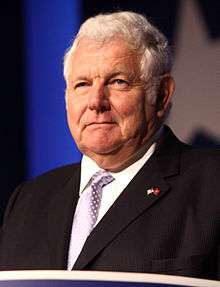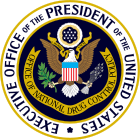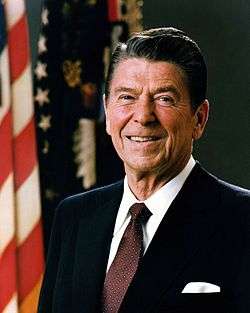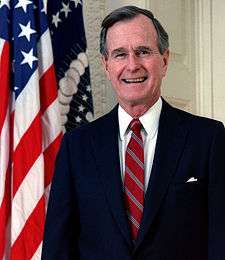William Bennett
| Bill Bennett | |
|---|---|
 | |
| Director of the Office of National Drug Control Policy | |
|
In office March 13, 1989 – December 13, 1990 | |
| President | George H. W. Bush |
| Preceded by | Position established |
| Succeeded by | Bob Martinez |
| 3rd United States Secretary of Education | |
|
In office February 6, 1985 – September 20, 1988 | |
| President | Ronald Reagan |
| Preceded by | Terrel Bell |
| Succeeded by | Lauro Cavazos |
| Chairperson of the National Endowment for the Humanities | |
|
In office December 24, 1981 – February 6, 1985 | |
| President | Ronald Reagan |
| Preceded by | Joseph Duffey |
| Succeeded by | John Agresto (Acting) |
| Personal details | |
| Born |
William John Bennett July 31, 1943 New York City, New York, U.S. |
| Political party |
Democratic (Before 1986) Republican (1986–present) |
| Spouse(s) | Elayne Glover |
| Children |
John Joseph |
| Alma mater |
Williams College University of Texas, Austin Harvard University |
| Religion | Roman Catholicism |
William John "Bill" Bennett (born July 31, 1943) is an American conservative pundit, politician, and political theorist, who served as Secretary of Education from 1985 to 1988 under President Ronald Reagan. He also held the post of Director of the Office of National Drug Control Policy under George H. W. Bush. In 2000, he co-founded K12, a publicly traded online education company.
Life and career
Bennett was born in Brooklyn, the son of Nancy (née Walsh), a medical secretary, and F. Robert Bennett, a banker.[1][2] He moved to Washington, D.C., where he attended Gonzaga College High School. He graduated from Williams College, where he was a member of the Kappa Alpha Society, and went on to earn a Ph.D. from the University of Texas at Austin in Political Philosophy. He also has a J.D. from Harvard Law School.
From 1979 to 1981, he was the executive director of the National Humanities Center, a private research facility in North Carolina. In 1981 President Reagan appointed him to chair the National Endowment for the Humanities, where he served until Reagan appointed him Secretary of Education in 1985. Reagan originally nominated Mel Bradford to the position, but due to Bradford's pro-Confederate views Bennett was appointed in his place. This event was later marked as the watershed in the divergence between paleoconservatives, who backed Bradford, and neoconservatives, led by Irving Kristol, who supported Bennett. It was in 1986 that Bennett switched from the Democratic to the Republican party. Bennett resigned from this post in 1988, and later was appointed to the post of Director of the Office of National Drug Control Policy by President George H. W. Bush. He was confirmed by the Senate in a 97-2 vote.
Bennett is a member of the National Security Advisory Council of the Center for Security Policy (CSP). He was co-director of Empower America and was a Distinguished Fellow in Cultural Policy Studies at the Heritage Foundation. Long active in United States Republican Party politics, he is now an author, speaker, and, from April 5, 2004 through April 1, 2016, the host of the weekday radio program Morning in America on the Dallas, Texas-based Salem Communications.[3] In addition to his radio show, he was the Washington Fellow of the Claremont Institute. Further work at the Claremont Institute included his role as Chairman of Americans for Victory Over Terrorism (AVOT). He was also a political analyst for CNN until his termination in 2013.
He is a Senior Advisor to Project Lead The Way, one of the nation’s leading providers of training and curriculum to improve STEM education in American schools; he is on the advisory board of Udacity, Inc., Viridis Learning, Inc. and the board of directors of Vocefy, Inc. and Webtab, Inc. He is also the Chief Education Advisor to Beanstalk Innovation, an international education company.[4]
Bennett and his wife, Mary Elayne "Elayne" Glover, have two sons, John and Joseph. Elayne is the president and founder of Best Friends Foundation, a national program promoting sexual abstinence among adolescents. He is the brother of Washington attorney Robert S. Bennett.
Political viewpoints
Bennett tends to take a conservative position on affirmative action, school vouchers, curriculum reform, and religion in education. As Education Secretary, he asked colleges to better enforce drug laws and supported a classical education. He frequently criticized schools for low standards. In 1988 he called the Chicago public school system "the worst in the nation."[5] He coined the term "the blob" to describe the state education bureaucracy,[6] a term which was later taken up in Britain by Michael Gove.[7]
Bennett is a staunch supporter of the War on Drugs and has been criticized for his views on the issue. On Larry King Live, he said that a viewer's suggestion of beheading drug dealers would be "morally plausible."[8] He also "lamented that we still grant them [drug dealers] habeas corpus rights."[9]
In 1995, he teamed up with C. Delores Tucker to create advertising to target Time Warner's lack of regulation of gangsta rap and its supposed glorification of violence and denigration of women. Bennett is a member of the Project for the New American Century (PNAC) and was one of the signers of the January 26, 1998 PNAC Letter[10] sent to President Bill Clinton urging Clinton to remove Iraqi leader Saddam Hussein from power.
Books
Bennett's best-known written work may be The Book of Virtues: A Treasury of Great Moral Stories (1993), which he edited; he has also authored and edited eleven other books, including The Children’s Book of Virtues (which inspired an animated television series) and The Death of Outrage: Bill Clinton and the Assault on American Ideals (1998).
Other books
- Tried by Fire: The Story of Christianity's First Thousand Years (2016)
- Is College Worth It? with David Wilezol (2013)
- The Fight of our Lives co-authored with Seth Leibsohn (2011)
- The Book of Man: Readings on the Path to Manhood (2011)
- A Century Turns: New Hopes, New Fears (2010)
- The True Saint Nicholas (2009)
- The American Patriot's Almanac: Daily Readings on America (2008 with John Cribb)
- America: The Last Best Hope (Volume II): From a World at War to the Triumph of Freedom (2007)
- America: The Last Best Hope (Volume I): From the Age of Discovery to a World at War (2006)
- Why We Fight: Moral Clarity and the War on Terrorism (2003)
- The Broken Hearth: Reversing the Moral Collapse of the American Family (2001)
- The Educated Child: A Parent's Guide from Preschool through Eighth Grade (1999)
- The Index of Leading Cultural Indicators (1999)
- Our Sacred Honor (1997, compilation of writings by the Founding Fathers)
- Body Count: Moral Poverty...and How to Win America's War Against Crime and Drugs (1996)
- Moral Compass: Stories for a Life's Journey (1995)
- The De-Valuing of America: The Fight for Our Culture and Our Children (1992)
- James Madison Elementary School: A Curriculum For American Students (August 1988, as Secretary of the Department of Education)
- James Madison High School: A Curriculum For American Students (December 1987, as Secretary of the Department of Education)
- First Lessons. A Report on Elementary Education in America (co-authored in September 1986, as Secretary of Department of Education)
Writing
Bennett writes for National Review Online, National Review and Commentary. He is a former senior editor of National Review and wrote the book "To Reclaim a Legacy."
Radio and television programs
Bennett is the host of Morning in America, a nationally syndicated radio program produced and distributed by Salem Communications. The show airs live weekdays from 6 to 9 a.m. Eastern Time; it is one of the only syndicated conservative talk shows in the morning drive time slot. However, its clearances are limited due to a preference for local shows in this slot, and the show gets most of its clearances on Salem-owned outlets. Morning in America is also carried on Sirius Satellite Radio, on Channel 144, also known as the Patriot Channel[11] Bennett retired from full-time radio on March 31, 2016.[12]
In 2008, Bennett became the host of a CNN weekly talk show, Beyond the Politics. The show did not have a long run, but Bennett remained a CNN contributor until he was let go in 2013 by then-new CNN president, Jeff Zucker.
Controversies
Gambling
In 2003 it became publicly known that Bennett was a high-stakes gambler who reportedly lost millions of dollars in Las Vegas.[13] Criticism elevated in the wake of Bennett's publication, The Book of Virtues, in which he argued for self-discipline— an attribute at odds with problem gambling. Bennett and Empower America, the organization he co-founded and headed at the time, opposed an extension of casino gambling in the states.[14]
Bennett never said he had a gambling problem, and maintained that his habit did not put himself or his family in any financial jeopardy. After Bennett's gambling problem became public, he said he did not believe his habit set a good example, that he had "done too much gambling" over the years, and his "gambling days are over". "We are financially solvent," his wife Elayne told the USA Today. "All our bills are paid." She added his gambling days are over. "He's never going again," she said.[15]
Several months later, Bennett qualified his position, saying "So, in this case, the excessive gambling is over." He explained "Since there will be people doing the micrometer on me, I just want to be clear: I do want to be able to bet the Buffalo Bills in the Super Bowl."[16]
Radio show abortion comment
On September 28, 2005, in a discussion on Bennett's Morning in America radio show, a caller to the show proposed that “lost revenue from the people who have been aborted in the last 30 years" could preserve Social Security if abortion wasn't permitted following Roe v. Wade. Bennett responded that aborting all African-American babies "If you wanted to reduce crime, you could—if that were the sole purpose—you could abort every black baby in this country and the crime rate would go down. That would be an impossible, ridiculous, and morally reprehensible thing to do, but your crime rate would go down."[17]
Bennett responded to the criticism saying, in part:
- A thought experiment about public policy, on national radio, should not have received the condemnations it has. Anyone paying attention to this debate should be offended by those who have selectively quoted me, distorted my meaning, and taken out of context the dialog I engaged in this week. Such distortions from 'leaders' of organizations and parties is a disgrace not only to the organizations and institutions they serve, but to the First Amendment.[18]
See also
- Legalized abortion and crime effect
- List of U.S. political appointments that crossed party lines
- Race and crime
- Roe effect
References
- ↑
- ↑
- ↑ http://www.prnewswire.com/news-releases/srns-bill-bennett-to-step-back-from-morning-microphone-hugh-hewitt-moves-to-mornings-300214959.html
- ↑ https://www.edreform.com/edreform-university/resource/william-j-bennett/
- ↑ Schools and Education
- ↑ http://www.edweek.org/ew/articles/1987/09/09/07200023.h07.html
- ↑ http://www.spectator.co.uk/2010/01/michael-gove-vs-the-blob/
- ↑ (on a June 15th, 1989 appearance on Larry King Live)
- ↑ Balko, Radley (2010-12-20) Beyond Bars, Reason
- ↑ The Indy Voice..."Be the change you want to see in the world." » Project New American Century
- ↑ Sirius Channel Listing
- ↑ http://www.hollywoodreporter.com/news/hugh-hewitt-larry-elder-salem-879432
- ↑ David von Drehle (2003-05-03). "Bennett Reportedly High-Stakes Gambler - Former Education Secretary Lost $8 Million in Past Decade, Magazines Find". The Washington Post.
- ↑ Joshua Green (2003). "The Bookie of Virtue". The Washington Monthly. Retrieved 2008-04-08.
- ↑ "GOP moralist Bennett gives up gambling". CNN. 2003-05-05. Retrieved 2008-04-08.
- ↑ Are Bill Bennett’s gambling days over or not? - The Carpetbagger Report
- ↑ McNamara, Robert. Multiculturalism in the Criminal Justice System, McGraw-Hill, 2009.
- ↑ Transcripts: CNN Saturday Morning News . October 1, 2005
External links
| Political offices | ||
|---|---|---|
| Preceded by Joseph Duffey |
Chairperson of the National Endowment for the Humanities 1981–1985 |
Succeeded by John Agresto Acting |
| Preceded by Terrel Bell |
United States Secretary of Education 1985–1988 |
Succeeded by Lauro Cavazos |
| New office | Director of the Office of National Drug Control Policy 1989–1990 |
Succeeded by Bob Martinez |



